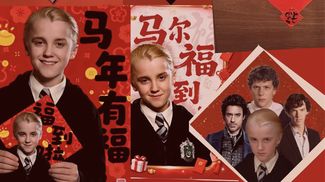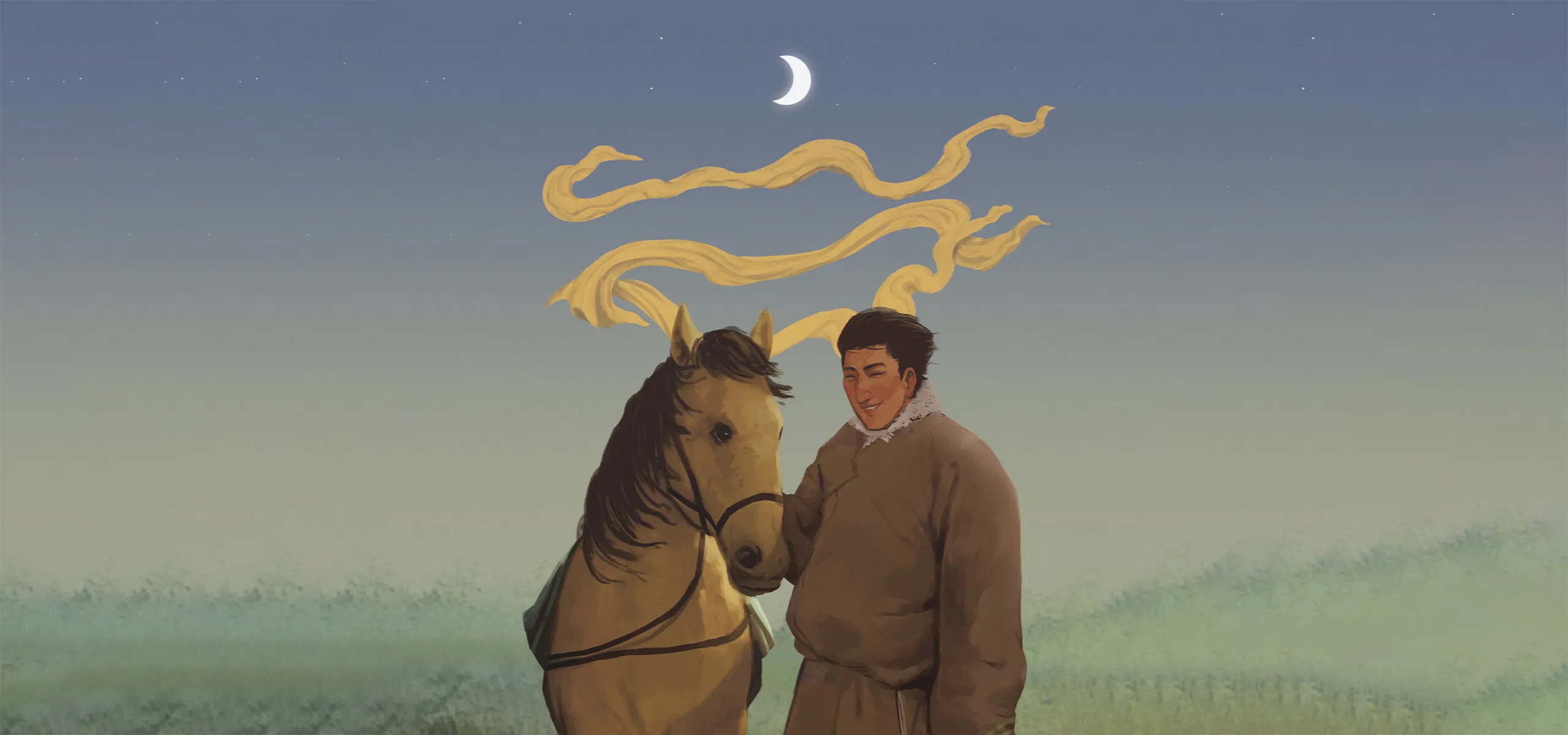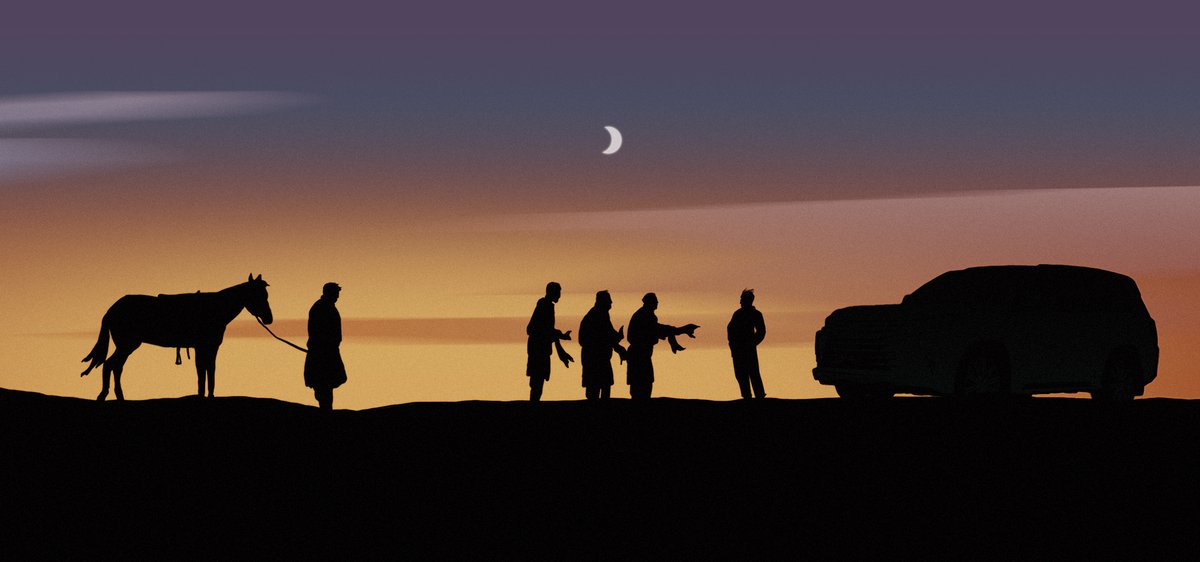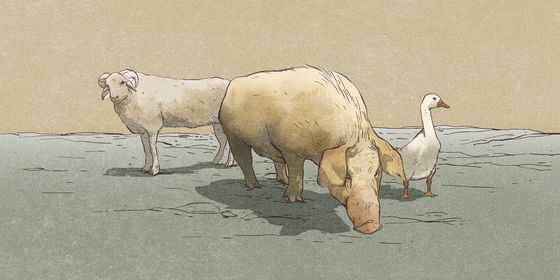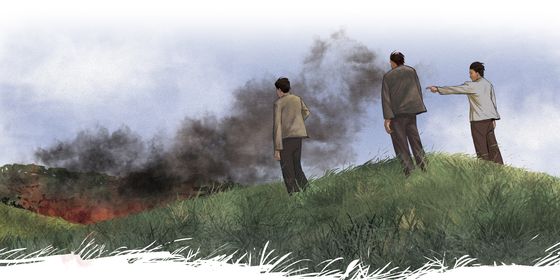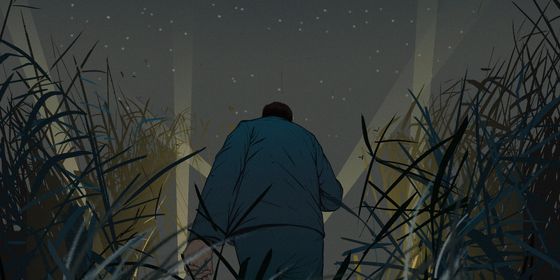A young Tibetan herder and his unruly stallion were warned off the local race. The question is—will they listen?
Uninvited guests, thought Lobsang Tashi, as he watched the men shuffling toward him. The Pogesar Plains no longer held many surprises for him, but might this be one? He had heard the gossip of Pogesar swapping tales about a man called Purtsa Gyalo Döndrup. They rammed together the name as if it belonged to a single soul, but Lobsang knew that these were the monickers of a trio.
The man walking up front was called Purtsa. Lobsang took his measure first. All of the herders on the Pogesar Plains had sharp eyes—not only the meaty pair above their cheeks, but another set, too, somewhere deep inside. Lobsang was looking at Purtsa with the second set.
Purtsa, on the other hand, believed a glance at Sherab the Yellow Stallion would suffice. He needed nothing more than his two earthly eyes. As he approached, he motioned disdainfully at the horse. He dared to speak openly in front of Lobsang’s family: “My opinion might sting, but I don’t think it’s right to hold back.”
Lobsang walked stiffly to his horse’s side. He combed the horse’s braided mane with his fingers, then slipped his hand down to grip the rope of yak hair fixed to the bridle.
“Come with me,” Lobsang whispered to the horse. “We won’t give them the pleasure of a reaction. I’ll let you piss in their bowls. They’ll take it as a tonic!”
Lobsang led the horse to a patch of grass nearby. He glanced back the way he had come. “Look!“ he urged the horse in a low voice. “From here, their table looks tiny. Those men there are no bigger than marmots.” He wanted to tell Sherab about the three men. He cleared his throat. He thought it best to start with Purtsa: “A shameless man!“ No, that was jumping to the conclusion too quickly. There was no need to rush through the story. If he lost his temper, the story would be incomprehensible to the horse. He needed to be sure that he didn’t stray from the facts.
Explore more short stories set in rural China:
“Let me start this way,” Lobsang said. “Purtsa is famous for his divorces. He has been divorced more times than the other two combined. Now, don’t get me wrong! I’m not saying that divorce is necessarily a moral failure. The specifics of each case need to be taken into account, right? Shhh. You’re fine. Just listen.” He stroked the yellow horse’s mane. The words began to spill out of him like the bone beads of a mala scattering on the floor when their string is snapped.
Lobsang pointed out the ring of keys tied at Purtsa’s waist. “A great big bunch of keys, isn’t it? Probably weighs at least a jin. All those keys! That’s more than the keeper of the monastery has on his ring! There are one hundred and eight in total. But why so many, you ask? Purtsa doesn’t trust his women. He doesn’t only have a lock on the tsampa bin, he locks up the pantry. Even worse, he keeps all the keys for himself. When his wife needs to make tea, she has to ask him for the key to unlock the cabinet. If his wife wants to know what time it is, she has to ask him for the locked-up watch, too. He locks up the bowls. He keeps everything locked up. That’s why his wives always end up leaving him.”
Lobsang was ready to offer his conclusion: “So, you tell me, Sherab…Should a man like that be allowed to advise the Chairman of the Pogesar Plains Horse Racing Promotion Association? I consider it an insult to all of our intelligence!”
Lobsang noticed Sherab’s attention fading. The horse tossed its head, jerking so abruptly that Lobsang’s hand was almost knocked from his mane.
A plait slipped through Lobsang’s hand.
Sherab huffed out a whinny, drawing the eyes of the men.
“Sherab,” Lobsang said, “I’ve always said, your biggest problem is that you refuse at the worst possible times to be cooperative. You should learn from Purtsa’s two underlings. You see how closely the twins attend to him? A-ha! You didn’t realize they were identical twins, did you? I can tell by your face. But it’s true. They used to look quite similar. Their parents even got them mixed up. Later, after they left the house and got married, they started to become their own men. One of them became fat. His cheeks were tanned very dark. He started losing his hair. The other one became as skinny as a rail. Mean hatchet face. He grew his hair long. He looked like an old nag. Can you see the resemblance now?”
Lobsang went quiet. The three advisers to the association marched up to inspect Sherab. They didn’t seem to notice Lobsang standing beside his horse. Their eyes flickered with a weird, unfathomable light.
Lobsang listened to the three men talking, but nothing they said at first made much sense. After a moment, he realized that they were talking about Sherab. Purtsa was saying that the yellow horse had never taken part in any sanctioned races. Purtsa didn’t want Sherab to take part in this race, either. The association wanted to be sure that their own members’ horses took the top prizes. Sure, Purtsa would let the horse run—but not in this race, and not until he registered with the association.
“And so, that’s why we’ve come to speak with you,” Purtsa said. “We’re here on behalf of Chairman Dawa. He’s come up with a theory, you see…his ‘Moon Theory.’ It’s like this: you’re out walking on the grasslands, under a full moon, but if you choose not to look up at it, is it really there? His theory says it’s not. The moon ceases to exist. Chairman Dawa puts it better than I could: ‘If you refuse to see something, then it’s not really there.’ You got it? Sherab the Yellow Stallion might have made a name for himself across these Pogesar Plains, but if we don’t acknowledge him, then he doesn’t exist.”
“What do you mean, ‘doesn’t exist’?” Lobsang Tashi asked.
“That’s exactly what I mean,” Purtsa replied.
“But this is Sherab the Yellow Stallion—standing right in front of you. You can’t see him?”
“Well, I can see a horse standing there,” Purtsa said, “true enough. But who’s to say the horse I see in front of me is Sherab the Yellow Stallion?”
“There’s only one Sherab,” Lobsang said. “Have you people lost your minds?”
“I see a horse,” Gyalo said. “It is indeed yellow, as you say. It might be a stallion. But that doesn’t mean this is Sherab the Yellow Stallion.”
Lobsang could scarcely believe his ears.
“As it stands,” Döndrup said, “if Chairman Dawa doesn’t recognize Sherab the Yellow Stallion, then it simply doesn’t exist, just like the moon ain’t there, if he doesn’t look up at night...”
“The moon is there, whether anyone looks up at it or not,” Lobsang said, his eyes growing wider in disbelief. “This is Sherab the Yellow Stallion, whether or not anyone decides to recognize him as such.”
“What does it really mean when we say ‘the moon’?” Purtsa asked. “What is ‘Sherab’? These are titles. They don’t mean anything.”
“What exactly are you trying to say?” Lobsang said.
“If our Chairman can say the moon doesn’t exist,” Purtsa said, “according to his theory, then he can do the same for your horse. It’s up to him to decide.”
Lobsang felt a buzzing in his skull. He was dealing with madmen! Could they even be considered men at all?
Lobsang knew that the Chairman must have made clear to them that no matter what, they needed to look after the interests of the association. When he mentioned the Chairman, Purtsa’s eyes had gleamed. That gave it away—but Gyalo’s contorted expression would have, too, or the strange tics of Döndrup, whose lips curled while he spoke, like a smoker taking the first drag of the morning. But Lobsang would not give in so easily. If these men wouldn’t grant him the right to enter Sherab in the race, then he would take matters into his own hands. His scheming was interrupted by the approaching roar of an engine.
Lobsang glanced over the heads of the three men. A cloud of dust rose from the grasslands. It was being kicked up by a black Lexus LX570. Men who drove cars like that didn’t care about their functionality, only that the car granted the driver a particular status. Lobsang guessed that the man behind the wheel must be the chairman of the racing association.
Purtsa, Gyalo, and Döndrup visibly tensed up. The chairman had come in person. Why would he make the trip himself—did he not trust them? Surely not. But his own prestige was on the line. If the association’s registered stallions failed to take the top two prizes, his standing would be tarnished beyond repair. Even an LX570 couldn’t buy that back.
Purtsa pointed, and Gyalo and Döndrup followed his finger. They turned to see the Lexus steaming across the prairie like a mighty ship, riding the undulations in the grasslands as if they were waves. Soon, the car roared to a stop in front of them.
It was a moment worth savoring. Purtsa wore a panicked expression, like one of his own wives caught breaking the lock on the tsampa bin. Gyalo and Döndrup looked like they’d just woken up after their wedding—to another set of twins, naturally—and realized they slept with the wrong woman.
Purtsa felt around in his pocket and drew out a white khata. No, wrong one. He rummaged again and came up with a yellow one. He breathed a sigh of relief as he held the khata between his two hands. Gyalo and Döndrup scrambled to find their own yellow khata. When they had, and the salute was complete, the door of the LX570 finally opened. Chairman Dawa’s round head emerged, his few remaining hairs tossed by the wind. “Big brother,” Purtsa shouted.
Once again, Lobsang could not believe his ears. This was a violation of the customs of the highlands! It was obvious that Chairman Dawa was at least twenty years younger than Purtsa. It was bizarre to see an old crow like Purtsa salute a middle-aged man as his elder. But the Pogesar Plains no longer surprised Lobsang. He knew that the hard men of the range were often not quite what they seemed. They put up a good front. You could imagine them knocking a fencepost flat into the ground as easily as they chomped through a stick of straw. But, deep down, they were petty prattlers.
“Big brother,” Purtsa called again, “what brings you out this way? I told you we were going to handle this. No need for you to make the trip.”
“Big brother,” Gyalo said, “we’re right in the middle of teaching the yellow stallion’s owner a lesson in how the world works.”
“Brother Chairman,” Döndrup squeaked, “it’s very good that you’ve come. If you’re here to supervise, there’s no way we can foul things up.”
Each man in turn laid his khata around the neck of Chairman Dawa. With the garland of silk scarves, the chairman seemed to brim with self-assuredness. He seemed to swell with arrogance. Even his slack belly seemed to expand, straining against his shirt until a button popped off, exposing a slab of pale flesh.
The chairman took a step away from the car. He had no interest in concealing the reason for his visit. His gaze went immediately to Sherab the Yellow Stallion. The horse glared back at the chairman. His opinion of the racing association head was clear.
The chairman reached out with one hand to grab the rope hanging from the horse’s bridle and, with the other, felt desperately around his pockets, like a heart patient looking for his nitroglycerin. In the end, he produced not a pill, but the sort of cloth used to clean glasses. He didn’t need the cloth. He needed the magnifying glass wrapped inside it. He got closer to Sherab, then, with surprising deftness, flicked out the magnifying glass to inspect the horse’s ear. Before Lobsang could figure out what the chairman was doing, he was already moving the magnifying glass to the horse’s nose. Next, he examined Sherab’s teeth. This went on for a full five minutes, after which the chairman handed the magnifying glass to Purtsa and reached into his trouser pockets for a handkerchief. He wiped his hands clean, then dropped the handkerchief to be scattered by the wind.
After that, the chairman stared at Sherab, as if lost in thought. The horse watched Lobsang, who was studying the yellow fuzz scattered across the chairman’s pale, protruding belly. Even these humble hairs seemed to vibrate confidently. The chairman turned away from Lobsang before he spoke. His tone was proud, like the mating call of a rock partridge.
Chairman Dawa did not turn back. He seemed to be trying to prove that his Moon Theory could be applied to anyone—and not only moons and horses.
So, Lobsang did not exist. He wasn’t there. If Chairman Dawa did not look at Lobsang, and he did not exist, then the racing association head was addressing only the horse and his lackeys. Instead of five men, there were four.
“Did you ask whether or not he would sell it?” Chairman Dawa asked his underlings.
“We could ask,” Purtsa said, “but there’s no guarantee he’s willing to listen.”
“They say there will be a full moon tonight,” the chairman said. “But how full will it be? If we don’t look up at it, it doesn’t really matter. It’s not up there in the sky.”
“Don’t bother asking,” Lobsang cut in. “Sherab is not for sale.”
“Are you sure about that?” Purtsa said. “Think it over! This is a horse in his prime—and the good years are going to be short. We’re going to make sure Sherab the Yellow Stallion doesn’t exist. He’ll be like the moon. We won’t see him. I don’t want you to regret your decision.”
Lobsang took back Sherab’s lead. The racing association chairman had heard Lobsang’s voice, even if he would not acknowledge him. He walked back to the Lexus, got in, started the engine, and drove away.
How could the moon not really exist?
How could Sherab the Yellow Stallion not exist?
If the chairman’s theory was correct, did Lobsang himself not exist?
Lobsang ran his fingers through Sherab’s mane, then pressed his face against the horse’s muzzle. Sherab did not turn away. The hot breath from his nostrils smelled like grass. Lobsang felt as if he could not hold back his true feelings much longer. The thuggish men from the association finally left. He could still hear their words echoing in his ears. “They don’t want us to race, Sherab,” Lobsang said, “but that’s exactly what we’re going to do. I don’t give a damn about the chairman, or his Moon Theory.” He began leading the horse back home. He decided this was a time when he should seek the advice of his parents.
Lobsang tied Sherab at the hitching post outside. It was as quiet in the earthen home as the plains in the moments before dawn. His father sat holding a bowl of milk tea, watching the steam rise from it. His mother rested her chin in her palm, appearing to be lost in thought. Lobsang decided to break the silence first. He knew that he couldn’t start with the topic of Sherab. He began with something else, easing his way in the right direction. He rubbed his forehead tentatively. When he spoke, he was surprised by the mildness of his own tone. He wondered if his act had gone too far.
“Mama, papa,” he said, “it was certainly an interesting day, wasn’t it?”
“Indeed,” his father said, “the sort of day that makes you look at the world differently.”
“I was fighting to stop from laughing,” his mother said. “All those giggles—I had to swallow them.” She patted her belly.
“Yes,” his father said, “watching those three men from the association lecturing you so seriously, it all felt like a dream.”
“You can’t let those sorts of men get silly ideas,” his mother said. “All that nonsense they were talking? Well, it’s as ridiculous as—as trying to put a diaper on a dog!“
When his father chuckled, Lobsang saw the chance to say what was on his mind: “They’re saying they won’t let Sherab run. Why do they want to keep us out of the race?”
Although he already knew the answer, Lobsang adopted an expression of confusion. He pretended to be lost in a fog.
“By the Bodhisattva, do you even need to ask?” his mother said. “They’re afraid Sherab will win! Their own horses can’t keep up. They’re wicked men.”
“That’s right,” his father said. “I wonder why they even bother racing at all. Why not just have a little party and hand trophies to one another?”
“You’ve got it all wrong, old man,” his mother said. “They need to put on a show—and make sure it looks legitimate. Of course, they make sure to ban any challengers beforehand. Nobody watching from the outside would know what’s really going on.”
“I want to disprove the chairman’s Moon Theory,” Lobsang said. “I have an idea, but I need to know that you’ll support me.”
“You want to put Sherab in the race?” his father asked. “I’m with you!”
“But they’ve already told you they don’t want Sherab to run,” his mother said. “What are you planning?”
“Don’t worry,” Lobsang said. “I’ve got it all figured out.”
Lobsang went to prepare Sherab. He threw a saddle on the horse. He cinched the saddle tight around its belly. His parents came out to watch. Man and horse both saw the sympathy in their eyes. As Lobsang pulled himself astride and stuck his feet in the stirrups, Sherab did not need the squeeze of his rider’s knees to know that it was time to gallop.
The wind whistled in Lobsang’s ears. The landscape seemed to rush toward him. The mountains in front of Lobsang looked like two fists stacked atop each other. The tall grass of the hills waved like hair caught in a gale. The stream traced its way between green hummocks as round as overturned pots. He could imagine the sound Sherab’s hooves might make pinging off of them, as if they really were metal. But the horse avoided the imperfections in the plains, racing through the grass so fast that a dewy mist rose in his wake. In the highlands, it was the finest season. The bleating of the sheep at the foot of the mountain beckoned the lowing of the yaks. These sounds were carried and composed by the wind. In an instant, they seemed to have arrived at the Draksum Bertsegna Valley.
The Draksum Bertsegna Valley was one of the places where the Pogesar Plains narrowed. There were cliffs on either side of the valley, which ran like a pair of trains side by side across the grasslands.
Lobsang gasped. A peculiar black bird flew from the underbrush into the sky, making Sherab stagger. Lobsang was nearly pitched from the saddle.
He gripped the pommel with both hands and pulled himself back into position. He looked like a sack of wheat being set upright.
He spoke without thinking. He fell upon a word that had once been familiar to him.
“Drua-ko!“ Lobsang swore. “You scared the daylights out of me.”
Lobsang had once needed to break himself of this habit. Nobody liked the word. It was vicious. It meant “parentless brat.”
His father had forbidden the curse. “Drua-ko,” he had said to his son, “you go around saying that all day, you’re going to end up as one.”
Lobsang slapped himself across the mouth. But he noticed that the calm atmosphere of the Draksum Bertsegna Valley seemed not to have changed. A breeze tossed the braids in Sherab’s mane. More birds shot upwards, like so many stones catapulted from the underbrush.
The next sound he heard was hoofbeats. At first, he thought it was stones rolling down the cliffs, but there was no mistaking the equestrian cadence. It was as if the bandits that once haunted the valley had returned. In those days, men earned a living robbing the herders and traders that passed through. But they wound up exterminated. Lobsang’s father had told him about the time he was out herding sheep and heard the sound of bullets hitting flesh. The cries of the wounded echoed through the valley. The sheep huddled together, trembling.
Before he knew it, the hoofbeats seemed to be around him. A cloud of dust rolled around him, and when it cleared, he saw the three men from the association, each astride a horse.
Purtsa pulled up first. Everyone knew his mount. The black horse with the white blaze had a reputation among the herders of the Pogesar Plains. The stallion not only had won two races, but was known for its peculiar aggression toward its rivals. It had an absurdly long monicker, Snowland’s Big Black Bottle MSC1376. This sort of name, even for a registered horse, was a bit unwieldy. When Big Black spotted Lobsang’s horse, Purtsa’s stallion tossed his head, glared threateningly. The horse gnawed its bit, as if it intended to take a bite out of Sherab.
Gyalo was astride a sorrel. Döndrup rode a white horse. They both had impressive names, suitable for association horses. Gyalo’s was called Red Flags O’er the Plateau CL7676. Döndrup’s was Snowland’s Grand White Spirit SL769. Although Döndrup’s Grand White was jumpier, he was a better runner and maintained an advantage over Red Flags in their races. Lobsang knew all about the horses. He read about them in the association’s brochure. That did nothing to settle his nerves, however.
Purtsa, as was his habit, broke the silence unceremoniously: “Drua-ko! You don’t know your place, do you? I knew it. We figured we’d need to show up to dissuade you. If you think you’re going to get to our chairman, you’ve got another thing coming.”
Lobsang was stunned. It took him a moment to realize that the three association advisors had discerned his true intentions. He hadn’t let slip his plans to anyone. But he had heard Purtsa mention the Jajgyad Valley, and then overheard Chairman Dawa talking on the phone about the eligibility inspection scheduled for the next day. A sudden flash of insight struck Lobsang. The two clues clicked together, and the arrival of the three men proved that he’d guessed right.
Purtsa hollered again, letting the familiar curse fester on his lips. Lobsang felt anger rising within him. Sherab’s nostrils flared. The horse was ready to charge.
The wind carried the first curse away, so Purtsa shouted it again: “Drua-ko! We three are here to prove the chairman’s Moon Theory. If you—” He was cut off.
Lobsang felt a surge of momentum, as if someone had slammed the accelerator on the world. He tilted backwards. The wind stung his eyes. He felt tears. This was a physiological response, nothing to do with emotions.
Sherab snorted. The other horses saw his fearsome gaze and became afraid. He charged the men and horses like an M2 tank. Lobsang saw Gyalo’s sorrel flee in panic, followed by Döndrup’s white horse.
The other horses moved to escape, but Purtsa’s Big Black stayed locked in place, coiled like a leopard. Common sense said to go for the weaker foes, but Sherab charged for Big Black.
Bang! Sherab the Yellow Stallion tore past Big Black. Hooves kicked up high, his tail whipped behind him like a race car exhaust. Lobsang felt the horse hit a breaking point of speed—raw, unstoppable. The other three horses’ competitive instincts flared instantly. They raced tightly behind Sherab. Glancing back, Losang saw Big Black’s eyes shot through with blood. His rider, Purtsa, was practically snarling. The sorrel and the white horse stayed close, seven meters behind. Sherab ran as if mad, every stride carving arcs through the air, his braided mane beating rhythmically against his neck.
Suddenly, up ahead, a pit yawned in the grasslands. It was about eight meters across. Sherab was moving too quickly to stop before reaching it. Lobsang knew that even if he jerked the reins, the horse’s momentum would dump it into the pit. The pit wasn’t deep—only a couple of meters at most—but crashing into it would mean serious injury.
Lobsang braced himself and shut his eyes. He only heard one sound. It was a voice that said to him: “It is better to leap and crash than it is to lose one’s nerve and fall. Leap for glory! Don’t hesitate!“
In the air, on Sherab’s back, Lobsang could not tell whether they were moving quickly or slowly. They came back to the earth smoothly. Lobsang opened his eyes. His mouth gaped. His hands were frozen in place.
The three men behind were not so lucky. Their horses had not been going fast enough that they couldn’t have stopped. But Sherab’s leap provoked Big Black. Purtsa’s horse raced toward the pit, breathing hard, eyes bloodshot, the muscles in its neck strained taut...
Lobsang turned to look. Purtsa came first, cursing, with his left eye black. Big Black limped behind him. Gyalo and Döndrup followed their horses out of the pit. They were both panting. Gyalo spat a tooth into the grass. Döndrup spat a mouthful of blood. The three men and their horses had no more will to fight. Defeated, they watched Lobsang astride Sherab, racing effortlessly across the plains.
An unbearable sense of defeat made the men wilt. Purtsa suddenly recalled the chairman’s theory. If you didn’t look up at the moon, it wasn’t there. If you chose to ignore something, it did not exist. “None of this happened,” Purtsa muttered to himself.
“Never happened,” Gyalo and Döndrup echoed.
The wind rose. The dust of the plains rolled across the pit and wiped clean the footprints. Soon, it really did seem possible that nothing had actually happened.
Author’s Note: I was born on a vast grassland, where mornings began with the whinny of horses. Even in the city, amid the routines of work and life, I often picture one standing on a windy slope, its hooves tapping at the prairie as if to remind me of something. The series, “Lobsang Tashi and Sherab the Yellow Stallion,” began when I drove my battered Chevrolet deep into the grassland. At sunset, in the stillness, a young herdsman appeared with a yellow horse—tired, solitary. That moment lit a spark, and I wrote their first line in my phone.
Moon Theory | Fiction is a story from our issue, “Urban Renewal.” To read the entire issue, become a subscriber and receive the full magazine.


